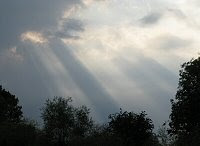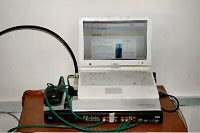 One of us posted a message suggesting that Islam does not support violence and that if we approach Muslims with fairness and kindness we would find the great majority of them to be peace loving people of goodwill, people who might be able to receive the good news of life in Christ if only we would set aside our fear of terrorism and religious war.
One of us posted a message suggesting that Islam does not support violence and that if we approach Muslims with fairness and kindness we would find the great majority of them to be peace loving people of goodwill, people who might be able to receive the good news of life in Christ if only we would set aside our fear of terrorism and religious war.I replied, 'I believe we need to be very cautious here. I'd be the first to recommend peace over war, love over hatred, gentleness over forcefulness, but there is something deeply dark about Islam.'
The original message post suggested we read the article 'Jihad' Not a License to Murder. As you will see if you read it yourself, it's a review of a book called 'A Deadly Misperception'.
I ended my reply with the following words,
We know that we serve the King of Kings, we know that the Father IS love. Certainly, it is love that will win the day in the end, not violence. We must pour out good things on those around us just like Jesus did. We must bless, not curse. But we should not accept anyone who comes with a different message. Be gentle, yes, always! But also be wise.
What was I getting at? What did I mean by 'something deeply dark'? Let's take a look at two aspects of Islam, what it claims and what it does. But before we start I want to stress that I have nothing in my heart but goodwill towards all people, everywhere, whatever they believe, whatever they do.
Love, sin, and forgiveness - I agree with the person who raised the subject on the mailing list. We must show love and respect towards Muslims whenever and wherever we meet them. We must accept all people at face value, not because they are Muslim or Hindu or Christian or Jewish (or of any belief) but because they are people. This is more true for a Christian than for anyone else. Yahshua told us and showed us that we are to love the Almighty with all that is in us, that we are to love one another as he loves us, that we are to love our neighbour just the same way we love ourselves, and that we are even to love our enemies. So on what grounds might we not love a Muslim?
We have all sinned, nobody walking this earth today or in the past can claim to have lived without sin except for one, Yahshua, Jesus, Isa, however you choose to name him. All have sinned and all will have to stand before the one who sits on the heavenly throne.
Will a person be forgiven or condemned? A Muslim cannot know until the judgement day, but if you have repented of your sin and fallen in sorrow and shame at Yahshua's feet believing he is who he claimed to be, if you have trusted in him and no other, he reaches down and raises you to your feet as a new creation. He forgives you, declares you to be free of sin, accepts you, and welcomes you. He also fills you with his presence so that he lives in you and changes you.
This changed life enables the believer to do things that would previously have been impossible. Loving your enemies is one of those things - Yahshua is love in person, because he lives in me I can love with his powerful love instead of my own feeble love.
So I must love all people even if they wish me harm, indeed even if they do me harm. This is utter foolishness to the world.
So what did I mean when I wrote, 'There is something deeply dark about Islam'?
First, I do not say there is something dark about a Muslim, but about Islam. There's a big difference, a Muslim is a person, Islam is a religion. So what do I mean by 'something deeply dark'?
What Islam says - Islam makes many claims and statements and most of them seem harmless enough. But there is one claim that Christians can never accept, and that is that anyone except Yahshua has preeminence.
Islam makes it very, very clear that Isa, though a great prophet, was a lesser prophet than Muhammad. They explain this by claiming that the New Testament writings have been corrupted since they were first penned. Muslims believe that Isa (Jesus) did not claim to be the Almighty dwelling in human form, this was an error added later. Muhammad is the last prophet, the Great Prophet, earlier prophets (including Isa) brought partial truth but Muhammad brought the full truth and the Qur'an (as recited in Arabic) is error-free. Translations are approximations to the meaning and can never be entirely error-free.
Yahshua said, 'I am the light of the world. Whoever follows me will never walk in darkness, but will have the light of life.' And John wrote, 'This is the message we have heard from him and declare to you: the Almighty is light; in him there is no darkness at all.' (John 8:12 and 1 John 1:5)
So we see that Yahshua is light and if we follow him we'll have his light as a guide, and that Yahweh is light without even a hint of darkness. We can see that in the same way the Holy Spirit (the Spirit of Christ) must also be light. Only light can illuminate our hearts and lives as he does. There is only one light, made known in three persons.
If we are not walking in the light, we are walking in darkness. Everyone who is not following Yahshua does not have the light and is walking in darkness. And who would want to draw a veil of darkness across our minds to prevent us following Yahshua? Why, the accuser, the enemy, the Prince of Darkness - who else?
Yahshua also said, 'The eye is the lamp of the body. If your eyes are good, your whole body will be full of light. But if your eyes are bad, your whole body will be full of darkness. If then the light within you is darkness, how great is that darkness!' (Matthew 6:22-23) A follower of Islam, denying that Yahshua is the light, is walking in darkness. See how this can change in the most dramatic way.
Quoting another member of the mailing list,
The Spirit of God will always point men to Christ. So if God is
revealing Himself to men through Islam, or any other religion it
will be evident by that alone.
The history of Islam - There is no space here to cover the history fully, it would take many books. Good places to start for anyone wanting to know more would be the Wikipedia articles on Islam, Muslim history and Muslim conquests. It is the spread of Islam that I want to mention briefly here.
Christianity spread by entirely peaceful means in its earliest phases. Believers were often imprisoned or killed for their faith, but they spread by sharing the good news, not by waging war on those around them. Yahshua criticised Peter for using a sword, and that is the pattern we should continue to follow.
There have been times when so-called Christians have used warfare to spread their control and influence. The Crusades in mediaeval times and the Spanish Inquisition are the most obvious examples of violence of this kind. But true followers of Christ would never use such methods! Knowing that Yahshua preached and practiced love towards enemies, how could we ever think that spreading our faith by war or torture could possibly be right? No, the people who did these things were not walking in the light!
And what of the early spread of Islam? Muhammad used warfare against his enemies, taking control in Yathrib (now Medina) and finally conquering Mecca. After his death, his followers continued to use warfare to conquer further cities and nations.
True followers of Yahshua are people of peace, loving all without distinction. Due to misunderstandings, false teachings, and trusting in worldly power rather than in grace those who claimed to follow Jesus have often fallen far short of his command to bless and love.
The same cannot be said of the followers of Islam where violent means are sometimes justifiable. Christianity has sometimes spread by the sword and should hang its head in shame. Islam has often spread by the sword and sees nothing wrong in that. In this way it swept across the whole of once-Christian North Africa. And the trend continues today. Islam aspires to bring the entire world under it's sway and some elements are willing to kill and maim by delivering bombs or raiding cities. We have seen it again and again and again - New York, London, Madrid, Mumbai.
There is a deep darkness hidden in Islam, it is more than just an absence of light. There is something lurking there that always tries to crush the light when he is brought near. Why is it that in the West, Muslims are allowed to build mosques but in Muslim lands Christians are persecuted? Why is it forbidden to share the gospel even in a 'secular' state like Turkey? Why is a Muslim punished (even sometimes with death) for converting to another faith?
Jihad? - Oh yes, there's the little matter of the meaning of the term 'jihad', also part of the original mailing list message and discussed in 'Jihad' Not a License to Murder.
Dictionaries are compiled by researching words as they are used in print. Or to look at it another way, a word means whatever people mean by it. Words also drift in meaning over time. 'Gay' used to mean no more than happy, colourful, joyful, and fun-loving but in today's dictionaries it has shifted considerably.
So what about the Arabic word 'jihad'. It has two meanings, the underlying sense is of a struggle, striving to achieve something, not giving up. It is sometimes used by Muslims to mean the internal struggle to live a holy and pure life, but it is also sometimes used by Muslims to mean warfare against the non-Muslim world. To claim the word has only the first meaning is simply unsupportable. Like all words - it means what people mean by it, no less and no more.










